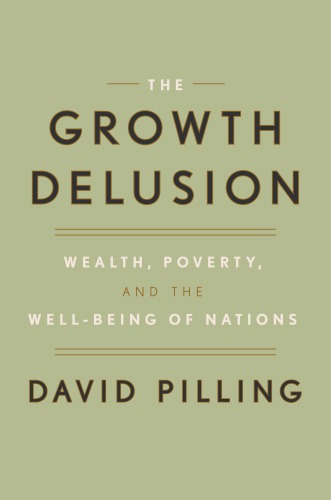
The Growth Delusion
Wealth, Poverty, and the Well-Being of Nations
کتاب های مرتبط
- اطلاعات
- نقد و بررسی
- دیدگاه کاربران
نقد و بررسی

December 1, 2017
Of economic growth and its discontents--and of new ways to gauge all of them."Growth for the sake of growth is the ideology of the cancer cell," the environmental curmudgeon Edward Abbey was fond of saying. One suspects that Financial Times associate editor Pilling would endorse the view, though he puts things less stridently in this studied look at economic growth and its measures and mismeasures. "Economics," he writes, "can present a distorted view of the world." True enough, especially because a sine qua non of modern economics is gross domestic product, a calculation of all the things that happen in an economy. But as the author memorably notes, GDP is morally indifferent: it "likes pollution," because money is spent to clean up environmental messes, and "likes crime because it is fond of large police forces and repairing broken windows." War and catastrophe? No problem, from a GDP point of view. Pilling examines some of the ways that renegade economists have proposed to consider the true health of an economy, with all the externalities of economic activity taken into account, from various equations to happiness rankings to the Genuine Progress Index, one of the more interesting "measures of economic welfare." Refreshingly, the author's approach does not require much background in economics, though a little familiarity with some of its key concepts would be helpful. He writes clearly about such new approaches as trying to enumerate the "services" nature provides--by which we can ponder what the survival of bees is worth, given their contributions to pollinating crops, and can think about the "existence value" of the great apes. Throughout, Pilling presses the point that the economy, as he writes, "is not real" but instead is shorthand for talking about trillions of transactions; in the same way, GDP "is just a clever way of measuring some of the stuff that we humans get up to."A fresh, lightly written look at issues noteworthy for their complexity; just the book for the budding economist in the house.
COPYRIGHT(2017) Kirkus Reviews, ALL RIGHTS RESERVED.

February 1, 2018
Despite this work's title, Pilling (associate editor, Financial Times) examines not economic growth itself, but how it is measured and the problems inherent in using the popular Gross Domestic Product (GDP). He explains in detail how the GDP was devised and its many limitations. A country's decision whether to include the value of prostitution, illegal drugs, housework, or breastfeeding, the author points out, affects the resulting number. Pilling says the GDP also has difficulty in accounting equitably for disparate parts of the economy such as banking, Internet commerce, rapidly changing technology, the sharing economy, and multinational corporate activity. He calls for better public awareness of what GDP actually represents and more attention to be given to other measures of economic wellness that highlight important factors such as wealth, the ecosystem, and human happiness. VERDICT Though Pilling vacillates between serious discussion and humorous quips, his central points are clear and accessible to all readers wanting to learn more about GDP and its brethren. Readers may also be interested in Jason Hickel's forthcoming The Divide: Global Inequality from Conquest to Free Markets, which questions the positives of growth in the developing world.--Lawrence Maxted, Gannon Univ. Lib., Erie, PA
Copyright 2018 Library Journal, LLC Used with permission.

























دیدگاه کاربران